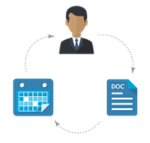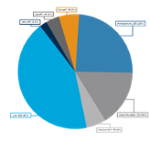Our team often hears questions about how to tackle legacy data with Relativity, and one of our Premium Hosting Partners, Lighthouse e-Discovery, recently wrote an interesting blog post with a case study on the issue. We wanted to share it with all of you. The post was originally published on Lighthouse's blog in April.
 Recently, one of our enterprise clients approached us with a unique challenge on a decades old case. For much of the case’s lifespan, counsel had used a Microsoft Access database to code information about events, documents, people, and issues. The Access database included multiple linked objects with tens of thousands of records.
Recently, one of our enterprise clients approached us with a unique challenge on a decades old case. For much of the case’s lifespan, counsel had used a Microsoft Access database to code information about events, documents, people, and issues. The Access database included multiple linked objects with tens of thousands of records.
Our project management pod collaborated with counsel to identify the information that would be meaningful moving forward, and then migrated that data to Relativity. As part of the migration, Lighthouse created a custom database, leveraging Relativity’s dynamic object functionality to preserve the complex relationships between the multiple objects existing in the original Access database.
Benefits abound when migrating old data to a modern platform like Relativity, but here are three key points our client was particularly concerned with:
 1. Adding new data seamlessly
1. Adding new data seamlessly
The client didn’t simply need to review their old data, they needed to add new data associated with it—events, comments, timeline information, etc. With complex coding layouts in Relativity, the process of adding new data is easy and seamless, and can be conducted by multiple users concurrently.
 2. Easily make new connections between people, data, and events
2. Easily make new connections between people, data, and events
The legacy database contained complex relational information about the parties and events in the case. Relativity’s dynamic object functionality not only preserved those relationships, but it also made it easy to add new relationships. Once the data was migrated to the Relativity environment, we used dynamic objects to create a sophisticated chronology of events linked to information about parties in the case, and key documents.
 3. Improved tracking and reporting
3. Improved tracking and reporting
With all the data, and all user activity regarding the data, in Relativity, generating reports on the data set is now a snap. Additionally, our team is able to leverage its scripting expertise to create custom reports using Relativity’s SQL backend.
How does your team manage legacy cases? Let us know in the comments, and learn more about how you can create custom solutions like Lighthouse's with Relativity's extensible platform here.









